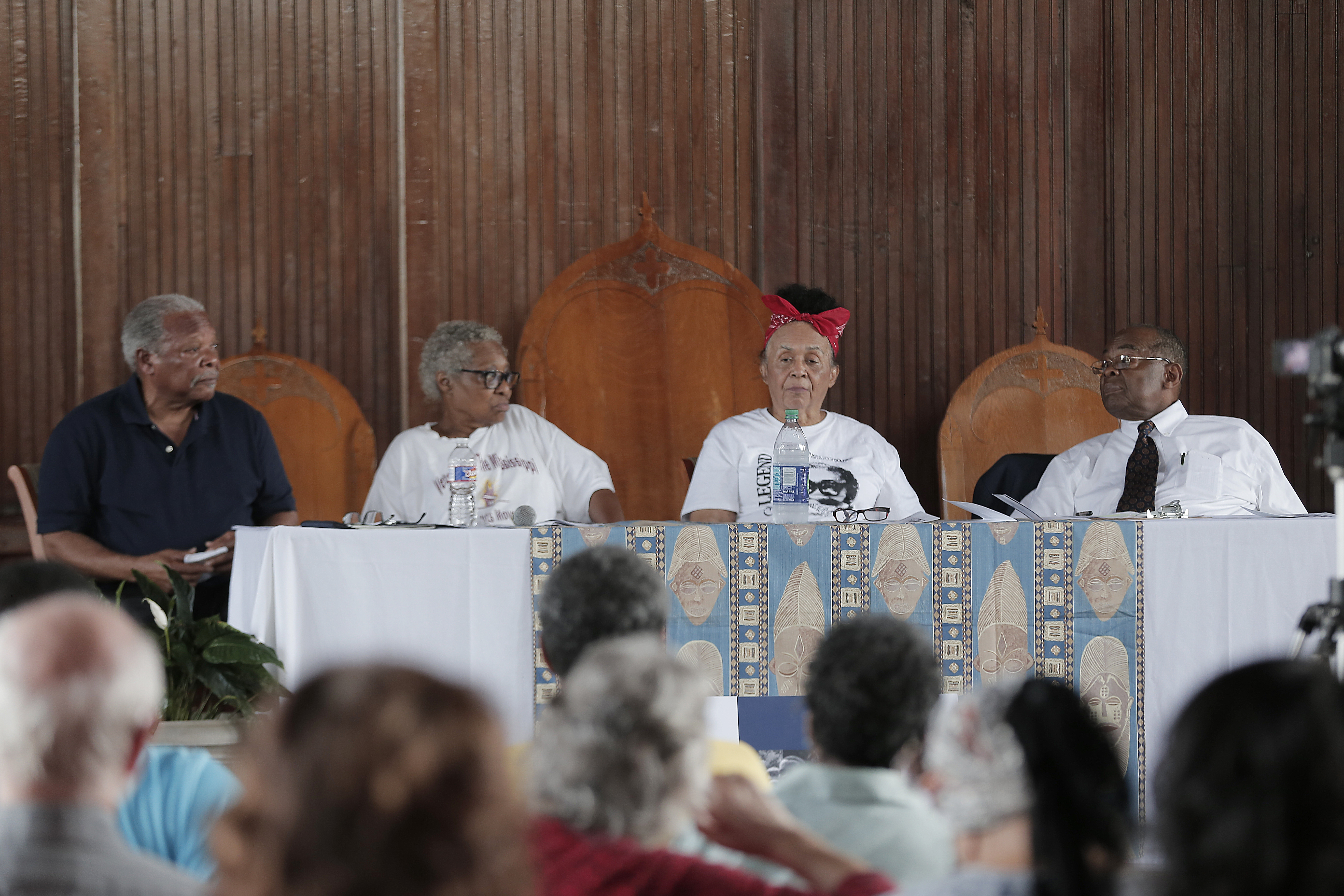Four marchers who participated in the “March Against Fear” in 1966 returned to Tougaloo College to talk about black freedom, then and now. (From left: Annie Pearl Avery, Dorie Ladner, Charles McLaurin and Robert Smith) Photo Courtesty Imani Khayyam
The rain had stopped pouring earlier on the morning of June 7, 1966. The marchers had made it two miles south of Hernando, Miss., on the second day of a soon-to-be remarkable “March Against Fear” from Memphis, Tenn., to Jackson, Miss. James Meredith, who was hated in much of white Mississippi for integrating at the University of Mississippi in 1962, was carrying a Bible in one hand and an ivory-handled cane in the other as he walked in what he calls “an earthly paradise called Mississippi.”
“Jammmesss!! Look Out! He Has A Gun!” James Meredith, 32, glanced over his shoulder and saw a white man holding a gun pointed at him. James Norvell was chubby, wearing a white shirt and sunglasses, and was determined to kill Meredith with the 16-gauge automatic Remington shotgun he was carrying.
“James,” the white man called out. “I only want James Meredith.” Meredith watched Novell climb out of the bushes, walking toward him with determination.
“Just Meredith,” Norvell added.
“It was the face of the deputy sheriff, the face of the man freed by an all-white jury after murdering a black man, the face of vicious young men carrying Confederate flags who hit civil rights workers with ax handles,” Meredith wrote decades later about Norvell in his book, “A Mississippi from God: A Memoir and Challenge for America” (Atria Books, 2012).
“Hit the dirt!” another marcher called to Meredith as Norvell took aim. He jumped down on the pavement, and the shooter missed his first shot. Then the white supremacist moved closer and fired again, hitting him with the next two shots. “I caught the biggest blast in my head. Over a hundred pellets hit me in the head, neck, back and legs. I was knocked flat,” Meredith wrote in his book.
Norvell vanished, leaving Meredith lying on the pavement. He was rushed to the hospital, but his injures were not fatal.
Staring Down the ‘Beast of White Supremacy’
Four years after his entry to the University of Mississippi caused deadly riots, Meredith had begun his “March Against Fear” the day before Novell fired on him, on June 6, 1966. Meredith, now 83 and a Jackson resident, had set out on the 220-mile trip from Memphis to Jackson to bring attention to the continuing problems black Mississippians faced and to get more of them registered to vote. As he was recovering from being shot, more than 15,000 marchers from around the country managed to register upwards of 4,000 African Americans in Mississippi to vote. He later rejoined the march.
“My mission on this march was to inspire black people to overcome their fear, face down the beast of white supremacy, and register,” Meredith wrote in his book. “I did not want this to be a mass demonstration, quite the opposite, I wanted the image of a lone unarmed American, protected only by a Bible and his American citizenship, to inspire black people to go down to their county courthouse and demand to be treated as Americans.”
On a warm and muggy Saturday morning, civil-rights activists and supporters gathered in Tougaloo College’s Woodworth Chapel on June 26, 2016, to celebrate the 50th anniversary of Meredith’s famous walk in a ceremony called “The March Against Fear and Tougaloo College: A Safe Haven.” Four of his fellow marchers and supporters—Annie Pearl Avery, Dorie Ladner, Charles McLaurin and Robert Smith—answered questions from the audience in the event sponsored by the Veterans of the Mississippi Civil Rights Movement, Inc. and the Fannie Lou Hamer Institute, as well as Tougaloo College and Nissan.
Tougaloo, a historically black college, was a key location in Mississippi’s Civil Rights Movement. This historic college, a haven for the Civil Rights Movement, was a place for the marchers to rest and receive food or any medical attention before they officially walked into Jackson. People looked forward to marching on the soil of a legendary and significant college such as Tougaloo. “It felt like heaven when we finally arrived on the campus,” Dr. Robert Smith said at the commemoration celebration.
‘We Have Plenty to Fight For’
Many of the comments focused on today, with the elders telling the young people in the audience that they need to take the torch. “We have plenty to fight for,” said Avery when asked by an audience member “What do we have to fight for today?” Avery, born in 1943, in Birmingham, Ala., joined the Student Nonviolent Coordinating Committee—or SNCC, pronounced like “Snick”—at age 16. She was arrested many times during voter-registration drives in the South, and was threatened by whites opposed to integration and black Americans voting.
Ladner, a Hattiesburg native who joined the Movement after hearing about 14-year-old Emmett Till’s death in 1955, told the attendees that “none of us are free as long as the least of us are free.”
Smith, who was also a member of SNCC, warned that the right to vote is still threatened 50 years after James Meredith was stuck down by a white supremacist on the march. “Yes,” he said, “you have the right to vote, but we have thousands of people in Mississippi who still aren’t registered. There is a serious need for voter education.”
The American Civil Liberties Union reports that over the last eight years, some legislators have worked hard to make it harder for African Americans and other non-white groups to vote in America. Mississippi passed a voter-identification law in 2012 that has drawn harsh criticism because the state has very few voting problems that the law would address. Mississippi is one of only nine states in the U.S., mostly in the south and the west, that maintains the right to take away the right of felons to vote permanently, even after they have served their time and come off probation.
“ACLU of Mississippi is committed to protecting the right to vote and provide voter education,” said Zakiya Summers, director of communications at ACLU of Mississippi. “ACLU stands ready to respond and advocate with the support of legal and voting-rights network.”
Many people who attended the event agreed that the upcoming generation has to stand up and take responsibility for righting today’s wrongs, just as the marchers did decades ago. “Our challenge today is will we be brave enough to stand up for what’s right,” Tougaloo College President Beverly Hogan told the audience.

